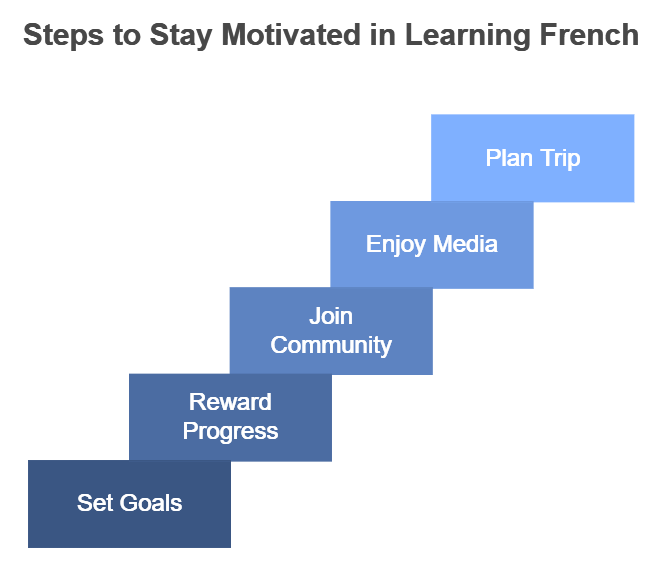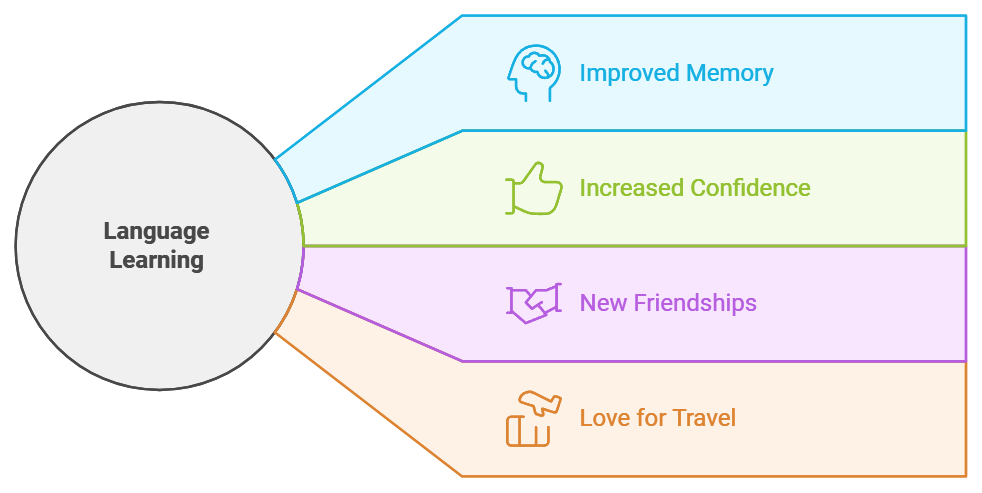Can You Learn French at 60?
Yes, you absolutely can learn French at 60! Age is just a number when it comes to learning a new language. With the right mindset and tools, you can start your French journey at any age and reap the many benefits it offers.
Key Takeaways:
• Learning French at 60 is not only possible but beneficial for brain health
• Various learning methods are available, from apps to immersion programs
• Overcoming emotional barriers is crucial for success
• Technology can greatly assist older learners in their language journey
• Learning French can enhance social connections and cultural appreciation
The Science Behind Learning French at 60
Neuroplasticity and Language Acquisition in Older Adults
Your brain is more flexible than you might think! Scientists call this flexibility “neuroplasticity.” It means your brain can form new connections at any age. When you learn French, you’re giving your brain a workout and keeping it young.
Cognitive Benefits of Learning French Later in Life
Learning French isn’t just fun – it’s good for your brain too! Studies show that bilingual seniors have:
• Better memory
• Sharper focus
• Lower risk of dementia
Dr. Thomas Bak, a lecturer at the University of Edinburgh, found that learning a new language can delay dementia by 4-5 years. That’s a big deal!
Comparative Studies: Younger vs. Older Language Learners
You might think younger folks have all the advantages, but that’s not always true. Here’s a quick comparison:
| Aspect | Younger Learners | Older Learners |
|---|---|---|
| Speed of Learning | Generally faster | Slower but steady |
| Grammar Skills | May struggle | Often excel |
| Pronunciation | Usually better | Can improve with practice |
| Life Experience | Limited | Rich (helps with context) |
| Motivation | Varies | Often higher |
As you can see, older learners have their own strengths. Your life experience can actually help you understand and remember new concepts better!
Emotional and Psychological Aspects of Learning French at 60
Overcoming Common Fears and Anxieties
It’s normal to feel nervous about learning French at 60. You might worry:
• “I’m too old to start”
• “I’ll never be as good as younger learners”
• “I’ll embarrass myself”
Remember, these are just thoughts, not facts. Many successful language learners started late in life. You can do it too!
Boosting Self-Confidence Through Language Learning
Learning French can make you feel proud and accomplished. Imagine ordering your first café au lait in Paris or chatting with your French-speaking grandkids. These small wins add up and boost your confidence.
Maintaining Motivation: Strategies for Older Learners
Staying motivated is key. Try these tips:
- Set small, achievable goals
- Reward yourself for progress
- Join a French club or find a language partner
- Watch French movies or listen to French music
- Plan a trip to a French-speaking country

Effective Learning Methods for Seniors
Immersion Programs: Pros and Cons
Immersion programs can be great for quick progress. You’re surrounded by French all day! But they can also be intense and expensive. Consider a short program in Nice or Provence to see if it’s right for you.
Classroom Learning vs. Self-Study
Both methods have their place. Here’s a quick breakdown:
Classroom Learning:
• Structured lessons
• Immediate feedback
• Social interaction
Self-Study:
• Flexible schedule
• Learn at your own pace
• Often cheaper
Many seniors find a mix of both works best.
Online Courses and Language Apps for Older Adults
The internet has made learning French easier than ever. Popular apps like Duolingo or Babbel offer bite-sized lessons you can do anytime. Online courses from platforms like Coursera provide more in-depth learning.
Technology-Assisted French Learning for Seniors
Best Language Learning Apps for Older Adults
Not all apps are created equal. Look for ones with:
• Large, clear text
• Simple navigation
• Speech recognition for pronunciation practice
• Progress tracking
Some seniors love using Roku to watch French TV shows with subtitles.
Innovative Technologies: VR and Immersive Experiences
Virtual Reality (VR) is opening new doors for language learning. Imagine “walking” through Paris or having a virtual conversation with a French speaker. While it might seem high-tech, many seniors find VR intuitive and fun.
Social and Cultural Integration Through French
Enhancing Travel Experiences with Language Skills
Speaking French can transform your travels. You’ll be able to:
• Chat with locals
• Understand menus and signs
• Explore off-the-beaten-path places
Plus, locals often appreciate the effort, even if your French isn’t perfect!
Building Intergenerational Connections
Learning French can bring you closer to younger family members. Maybe you have grandkids learning French in school or a niece studying in Paris. Sharing a language creates special bonds.
Success Stories: Learning French After 60
Interview: Anna’s Journey from Beginner to Fluent French Speaker
Meet Anna, a former Russian scientist who started learning French at 62. Three years later, she’s reading French novels and planning her third trip to France. “It’s never too late,” she says. “French has opened a whole new world for me.”
Long-Term Impact: How Learning French Changed Lives
Many seniors report that learning French has:
• Improved their memory
• Increased their confidence
• Led to new friendships
• Sparked a love for travel
One 68-year-old learner even met his wife in a French class!

Practical Tips for Starting Your French Learning Journey at 60
- Start with common phrases and greetings
- Listen to French radio or podcasts while doing chores
- Label items in your house with French words
- Find a language exchange partner online
- Don’t be afraid to make mistakes – they’re part of learning!
Remember, learning French at 60 is not just possible – it’s a wonderful adventure. It keeps your brain sharp, opens new social doors, and can bring joy and accomplishment to your life. So why not start today? Bonne chance! (Good luck!)
